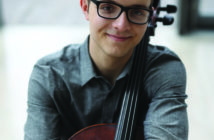Considering the phenomenal Brendel has a remarkably fine-tuned “ear,” not only when performing but with Listening to oth Brendel, who was born in Moravia in January 1931, swam against the prevailing Brendel continues to be described as an “intellectual” pianist. He only Recordings as springboard Recordings, rather than competitions or the musical star system, have served “There have been gains and losses,” he says. “A computer that edits quickly Even though his repertoire only covers a few centuries, as a listener Brendel Literature and kitsch Despite his stature as a pianist, Brendel has always seen beyond his piano Brendel hopes to continue these horizon-widening activities for many years. His recital program Brendel’s appearance in Montreal will be a landmark occasion. He humbly The program he is giving in Montreal on March 31 (and in Ottawa on April 14) The first half of the recital will include only music in a minor key, The concert promises to be a memorable one… Alfred Brendel will be performing on March 31 in Montreal and on April 12 in [Translated by Jane Brierley] Win Alfred Brendel CDs: <www.scena.org>.
number of articles written about Alfred Brendel, it might seem futile — or at
least not particularly useful — to take yet another look at this incomparable
pianist. He is an artist whose peers hold him in the highest regard. He is a
perfectionist when it comes to technique, and a musical interpreter of profound
sensitivity. In fact, he challenges the standards, expectations, and unspoken
laws of the classical music jungle and emerges greater than ever, yet able to
maintain a disconcerting frankness and modesty.
regard to life in general, and he leads parallel lives that are mutually
enriching. He is a chamber player (he recently joined with baritone Matthias
Goerne, to the delight of fans of the vocal art); he performs with orchestra (in
April he will perform all of Beethoven’s concertos with Seiji Osawa and the
Boston Symphony Orchestra) and as a soloist (recitals in Montreal and Ottawa are
scheduled for March and April). Brendel is also an essayist (Thoughts and
Afterthoughts has been providing absorbing reading for musicians and
music-lovers for over thirty years); a new-fledged poet (his collection, One
Finger Too Many reveals his wild sense of humour); a collector; and a great
reader, especially of works that deal with the mystery of life and eternity. His
multi-faceted nature makes him one of the most well-rounded artists of his
generation. It was an immense privilege and pleasure for La Scena
Musicale to share a few moments with him recently.
 er pianists
er pianists
musical current from the beginning. He started taking lessons at the age of six
and almost immediately began exploring composition. As his father’s various
trades took the family from Yugoslavia to Austria, he switched teachers and
towns fairly frequently. After the age of sixteen, however, he had no more
teachers. “A teacher can have too great an influence,” he told us. “I was
self-taught, and I learned to be wary of anything that I hadn’t understood
myself.” He found something more useful than teachers: listening to other
pianists, especially Edwin Fischer, Alfred Cortot, and Wilhelm Kempff. Brendel
speaks reverently of these keyboard giants. “They were well-rounded musicians,
not just piano virtuosos; some were also chamber musicians, some of them
conducted. They were masters of the piano sound as I see it, they could
orchestrate on the piano. They respected the composers and didn’t place
themselves first, but they were anything but boring and not mere carbon copies
of the music.”
entered one international competition, the Bolzano in Italy, and on that
occasion he ranked fourth (a first prize was not given). His choice of
repertoire has always seemed at the opposite end of the spectrum from the
virtuoso fireworks of some of his colleagues. Apart from a few forays into the
contemporary repertoire – Brendel was an ardent defender of Shoenberg’s
Concerto almost from the beginning, for example – his choice of music has
always focused on the great classical composers: Bach, Haydn, Mozart, Schubert
and, of course, Beethoven (he has done several complete renditions of the
thirty-two sonatas, both in concert and in recordings). He doesn’t play the
Russian and French repertoire or Schumann and Brahms, yet he has always included
the much-neglected Liszt in his programs.
Brendel as a career springboard. Long before his American début in 1963,
the public was familiar with his many recordings of Beethoven and Liszt for the
Vox label. However, he takes the technological strides of the recording industry
with a grain of salt.
is a great gain. But still, some of those recordings from the ‘30s and ‘40s, or
some Kempff recordings from the ‘50s, are unsurpassed. A live recording, if
executed at the right moment, proves the abilities of the pianist.”
admits to being particularly fond of works so contemporary that the ink is
barely dry. “A little less than 100 years ago, music was breaking away from
tonality and harmony. It was one of the most amazing events in the history of
art, and I’m still fascinated and excited by it. I know much more of it now and
that gives me the opportunity to judge what is new, something that has never
been done before or combined in that particular fashion, which opens up a new
aspect to the listening of music. To understand what makes a masterpiece, I use
the same criteria: has it been done elsewhere, is it like another piece by the
composer or does it present something unexpected and necessary?”
keyboard. Writing non-fiction and more recently poetry, as well as being an
art-lover, has opened up horizons that he feels are essential to him. “I need
these to nourish my thoughts and my senses as well as for aesthetic pleasures,”
he says, noting that he has always been fascinated by things that go beyond the
limits of Nature. “I strive to hit a combination of sense and nonsense,”
he says. Brendel also collects masks and the cartoons of Edward Gorey and Gary
Larson (the hilarious American author of The Far Side), as well as kitsch
objects, because, he says, “Kitsch sharpens the perception of what is genuine
and what is not. The perception of what is kitsch and what is not has been lost
by most.”
“I try to be as fresh and as naive as possible every time I return to a piece. I
am not prepared to be satisfied with anything, I think one should go on and try
to improveÉ remaining humble while facing the masterpieces.” Such words of
wisdom seem completely natural coming from this Titan of the piano, a
larger-than-life personality who is always profoundly human. Going beyond time
and fashion, it could have been to him that the great pianist-composer Busoni
dedicated his definition of a pianist: “The pianist must have unusual
intelligence and culture, feeling, temperament, imagination, poetry, and finally
that personal magnetism which sometimes enables the artist to inspire four
thousand people, strangers, whom chance has brought together, with one and the
same feelingÉ If any of these qualities are missing the deficiency will be
apparent in every phrase he plays.” In our competitive world, it is reassuring
to note that, despite everything, Brendel can fulfil all his responsibilities
and still touch the hearts of the faithful fans who throng to his recitals. The
art of the piano lives on.
admits to not having played here often over the years. The humour of the
situation immediately surfaces. “Montreal has been for me a place of mishaps. My
first orchestral concert in America was in Montreal with Zubin Mehta (I was
performing the Brahms’ D Minor Concerto) and in the middle of the
performance a very important key, in the middle of the piano, got stuck and I
had to lift it up all the time. When I returned to Montreal and played a
recital, again there was trouble with the action of the piano. When I came back
to play with the Orpheus Chamber Orchestra, at rehearsal a note stalled. There
seems to be a jinx. Hopefully this time it will all work out!”
is built around his favourite composers: Haydn, Mozart, and Beethoven. The
second half of the program will be taken up with Beethoven’s Diabelli
Variations, a fifty-minute-long, monumental work that Brendel describes as
“the greatest piano work ever written, nothing less!” He is coming back
to this piece after ten years. “The piece stays in one key nearly the whole time
and yet gives you the whole variety and so many characters that the public is
not bored É hopefully! It is also a compendium of musical humour. Beethoven
treats the theme with a certain amount of irony.”
including Haydn’s Sonata in G Minor and Mozart’s Sonata in A Minor
and Fantasia in D Minor. “Mozart’s sonatas are certainly some of the most
difficult things in the repertoire. They’re very rarely played. People think
that since they learned some of these pieces in their youth they are not really
worthwhile for an artist. People who know something about piano playing share
Arthur Schnabel’s view that they are too easy for children and too difficult for
artists. Every note is so exposed, you can’t hide anything. Every little
inflection has to be exactly right, not too much, not too little, exactly in
place. It needs a great deal of experience and also technical maturity to get
the feeling of what’s essential and how to apply it in every detail.”
Ottawa.
Alfred Brendel – A Musical Paradox
0
Share:













